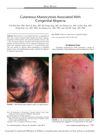 February 2024 in “Buletin Veteriner Udayana”
February 2024 in “Buletin Veteriner Udayana” Using sulfur soap helped improve skin problems in a dog with demodecosis.
 January 2024 in “Jurnal Ilmu Kesehatan Hewan”
January 2024 in “Jurnal Ilmu Kesehatan Hewan” The dog recovered well after treatment, showing no skin issues and normal hair growth.
 January 2024 in “Jurnal Ilmu Kesehatan Hewan”
January 2024 in “Jurnal Ilmu Kesehatan Hewan” Oreo the dog got better from skin and worm infections after treatment and cleaner living conditions.

Bee pollen, green tea, essential oils, and various plant extracts improve skin and hair health.
 July 2023 in “Jurnal Ilmu Kesehatan Hewan”
July 2023 in “Jurnal Ilmu Kesehatan Hewan” Sulfur-based treatments combined with simparica effectively treat scabies in puppies.
 June 2020 in “Journal of Dermatological Treatment”
June 2020 in “Journal of Dermatological Treatment” Use telemedicine and strict hygiene for safe hair and scalp treatments during COVID-19.

Diet and supplements can significantly affect acne, with some foods and nutrients reducing and others worsening it.
 July 2011 in “British Journal of Dermatology”
July 2011 in “British Journal of Dermatology” Dermatologists give better information on pathology forms, hypersensitivity vasculitis is a common skin issue, misdiagnoses can occur, and various skin conditions are linked to loss of elastin or genetic factors.
 3 citations,
November 2020 in “Planta medica international open”
3 citations,
November 2020 in “Planta medica international open” Plant-made bFGF helps cells grow and boosts collagen.
 5 citations,
July 2020 in “Journal of the American Academy of Dermatology”
5 citations,
July 2020 in “Journal of the American Academy of Dermatology” Adding antihistamines to topical corticosteroid and cryotherapy may improve hair regrowth in alopecia areata patients.
3 citations,
January 2021 in “International journal of general medicine” An 8-year-old boy with a scabies infection was successfully treated with permethrin, antihistamines, and antibiotics.
 1 citations,
March 1982 in “American pharmacy”
1 citations,
March 1982 in “American pharmacy” The Beverly Hills Diet is unhealthy and can cause serious health issues; pharmacists should advise against it and asthmatics should avoid nonprescription antihistamines.
 88 citations,
January 2011 in “Annals of Dermatology”
88 citations,
January 2011 in “Annals of Dermatology” The document concludes that specific itchy skin diseases during pregnancy have varying fetal risks and treatments, including corticosteroids and other medications.
 55 citations,
November 2004 in “Expert opinion on drug safety”
55 citations,
November 2004 in “Expert opinion on drug safety” Chemotherapy often causes hair loss, nail changes, and mouth issues, but these are usually manageable.
 48 citations,
October 1996 in “Dermatologic clinics”
48 citations,
October 1996 in “Dermatologic clinics” Some treatments can help with hair regrowth in alopecia areata, but results vary and long-term use is often needed without changing the disease's outcome.
38 citations,
September 2017 in “Journal of zoo and wildlife medicine” Oclacitinib maleate successfully treated alopecia in Andean bears.
 34 citations,
June 2014 in “The BMJ”
34 citations,
June 2014 in “The BMJ” Pregnancy can change skin disease severity, with some conditions improving and others worsening, and treatment should balance benefits and fetal safety.
 33 citations,
August 2006 in “Journal der Deutschen Dermatologischen Gesellschaft”
33 citations,
August 2006 in “Journal der Deutschen Dermatologischen Gesellschaft” Pregnancy can cause specific skin conditions that need correct diagnosis and treatment to protect both mother and baby.
 25 citations,
November 2013 in “Journal of the American Academy of Dermatology”
25 citations,
November 2013 in “Journal of the American Academy of Dermatology” Many patients on new leukemia drugs had mild to moderate skin reactions.
13 citations,
December 2007 in “The Journal of Dermatology” Fexofenadine may help treat alopecia areata.
11 citations,
December 2015 in “Indian journal of dermatology, venereology, and leprology” Dermoscopy quickly and accurately diagnosed a rare hair disorder in a 12-year-old girl.
 7 citations,
October 2019 in “Annals of palliative medicine”
7 citations,
October 2019 in “Annals of palliative medicine” New targeted cancer drugs can cause skin side effects, and managing them requires patient education and timely care.
 7 citations,
September 2013 in “Current Dermatology Reports”
7 citations,
September 2013 in “Current Dermatology Reports” Some skin medications are safe for pregnant women, but others pose risks or should not be used.
6 citations,
May 2012 in “The Journal of Dermatology” Fexofenadine may help treat a difficult type of hair loss.
 6 citations,
September 1990 in “International Journal of Gynecology & Obstetrics”
6 citations,
September 1990 in “International Journal of Gynecology & Obstetrics” The skin condition PUPP usually gets better on its own after giving birth and is unlikely to happen again in future pregnancies.
 5 citations,
January 2014 in “Hospital pharmacy”
5 citations,
January 2014 in “Hospital pharmacy” Using a strong allergy medicine too often on the scalp can cause swelling and inflammation.
 4 citations,
September 2014 in “Elsevier eBooks”
4 citations,
September 2014 in “Elsevier eBooks” Use some skin medications with caution during pregnancy; avoid strong steroids, certain eczema treatments, and systemic retinoids, but many topical treatments and nasal sprays are safe.
 4 citations,
October 1998 in “In Practice”
4 citations,
October 1998 in “In Practice” The conclusion is to thoroughly test for causes of cat hair loss and treat accordingly, considering medication only after serious conditions are ruled out.
 3 citations,
January 2019 in “Bulgarian Journal of Veterinary Medicine”
3 citations,
January 2019 in “Bulgarian Journal of Veterinary Medicine” The cat was put to sleep due to recurring infections.
 3 citations,
February 2012 in “The American Journal of Dermatopathology”
3 citations,
February 2012 in “The American Journal of Dermatopathology” A 3-year-old girl with skin mast cell buildup and congenital baldness improved with treatment, suggesting a rare link between these conditions.

























